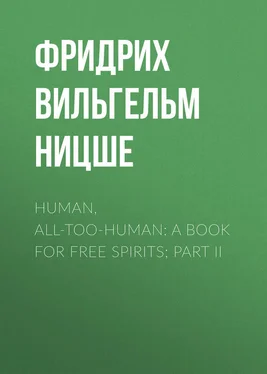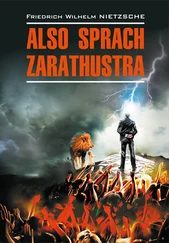Фридрих Ницше - Human, All-Too-Human - A Book For Free Spirits; Part II
Здесь есть возможность читать онлайн «Фридрих Ницше - Human, All-Too-Human - A Book For Free Spirits; Part II» — ознакомительный отрывок электронной книги совершенно бесплатно, а после прочтения отрывка купить полную версию. В некоторых случаях можно слушать аудио, скачать через торрент в формате fb2 и присутствует краткое содержание. Жанр: Философия, literature_19, foreign_antique, foreign_prose, на английском языке. Описание произведения, (предисловие) а так же отзывы посетителей доступны на портале библиотеки ЛибКат.
- Название:Human, All-Too-Human: A Book For Free Spirits; Part II
- Автор:
- Жанр:
- Год:неизвестен
- ISBN:нет данных
- Рейтинг книги:3 / 5. Голосов: 1
-
Избранное:Добавить в избранное
- Отзывы:
-
Ваша оценка:
- 60
- 1
- 2
- 3
- 4
- 5
Human, All-Too-Human: A Book For Free Spirits; Part II: краткое содержание, описание и аннотация
Предлагаем к чтению аннотацию, описание, краткое содержание или предисловие (зависит от того, что написал сам автор книги «Human, All-Too-Human: A Book For Free Spirits; Part II»). Если вы не нашли необходимую информацию о книге — напишите в комментариях, мы постараемся отыскать её.
Human, All-Too-Human: A Book For Free Spirits; Part II — читать онлайн ознакомительный отрывок
Ниже представлен текст книги, разбитый по страницам. Система сохранения места последней прочитанной страницы, позволяет с удобством читать онлайн бесплатно книгу «Human, All-Too-Human: A Book For Free Spirits; Part II», без необходимости каждый раз заново искать на чём Вы остановились. Поставьте закладку, и сможете в любой момент перейти на страницу, на которой закончили чтение.
Интервал:
Закладка:
All Beginning is Dangerous. – The Poet can choose whether to raise emotion from one grade to another, and so finally to exalt it to a great height – or to try a surprise attack, and from the start to pull the bell-rope with might and main. Both processes have their danger – in the first case his hearer may run away from him through boredom, in the second through terror.
In Favour of Critics. – Insects sting, not from malice, but because they too want to live. It is the same with our critics – they desire our blood, not our pain.
Success of Aphorisms. – The inexperienced, when an aphorism at once illuminates their minds with its naked truth, always think that it is old and well known. They look askance at the author, as if he had wanted to steal the common property of all, whereas they enjoy highly spiced half-truths, and give the author to understand as much. He knows how to appreciate the hint, and easily guesses thereby where he has succeeded and failed.
The Desire for Victory. – An artist who exceeds the limit of his strength in all that he undertakes will end by carrying the multitude along with him through the spectacle of violent wrestling that he affords. Success is not always the accompaniment only of victory, but also of the desire for victory.
Sibi Scribere. – The sensible author writes for no other posterity than his own – that is, for his age – so as to be able even then to take pleasure in himself.
Praise of the Aphorism. – A good aphorism is too hard for the tooth of time, and is not worn away by all the centuries, although it serves as food for every epoch. Hence it is the greatest paradox in literature, the imperishable in the midst of change, the nourishment which always remains highly valued, as salt does, and never becomes stupid like salt.
The Art-Need of the Second Order. – The people may have something of what can be called art-need, but it is small, and can be cheaply satisfied. On the whole, the remnant of art (it must be honestly confessed) suffices for this need. Let us consider, for example, the kind of melodies and songs in which the most vigorous, unspoiled, and true-hearted classes of the population find genuine delight; let us live among shepherds, cowherds, peasants, huntsmen, soldiers, and sailors, and give ourselves the answer. And in the country town, just in the houses that are the homes of inherited civic virtue, is it not the worst music at present produced that is loved and, one might say, cherished? He who speaks of deeper needs and unsatisfied yearnings for art among the people, as it is, is a crank or an impostor. Be honest! Only in exceptional men is there now an art-need in the highest sense – because art is once more on the down-grade, and human powers and hopes are for the time being directed to other matters. – Apart from this, outside the populace, there exists indeed, in the higher and highest strata of society, a broader and more comprehensive art-need, but of the second order . Here there is a sort of artistic commune, which possibly means to be sincere. But let us look at the elements! They are in general the more refined malcontents, who attain no genuine pleasure in themselves; the cultured, who have not become free enough to dispense with the consolations of religion, and yet do not find its incense sufficiently fragrant; the half-aristocratic, who are too weak to combat by a heroic conversion or renunciation the one fundamental error of their lives or the pernicious bent of their characters; the highly gifted, who think themselves too dignified to be of service by modest activity, and are too lazy for real, self-sacrificing work; girls who cannot create for themselves a satisfactory sphere of duties; women who have tied themselves by a light-hearted or nefarious marriage, and know that they are not tied securely enough; scholars, physicians, merchants, officials who specialised too early and never gave their lives a free enough scope – who do their work efficiently, it is true, but with a worm gnawing at their hearts; finally, all imperfect artists – these are nowadays the true needers of art! What do they really desire from art? Art is to drive away hours and moments of discomfort, boredom, half-bad conscience, and, if possible, transform the faults of their lives and characters into faults of world-destiny. Very different were the Greeks, who realised in their art the outflow and overflow of their own sense of well-being and health, and loved to see their perfection once more from a standpoint outside themselves. They were led to art by delight in themselves; our contemporaries – by disgust of themselves.
The Germans in the Theatre. – The real theatrical talent of the Germans was Kotzebue. He and his Germans, those of higher as well as those of middle-class society, were necessarily associated, and his contemporaries should have said of him in all seriousness, “in him we live and move and have our being.” Here was nothing – no constraint, pretence, or half-enjoyment: what he could and would do was understood. Yes, until now the honest theatrical success on the German stage has been in the hands of the shamefaced or unashamed heirs of Kotzebue's methods and influence – that is, as far as comedy still flourishes at all. The result is that much of the Germanism of that age, sometimes far off from the great towns, still survives. Good-natured; incontinent in small pleasures; always ready for tears; with the desire, in the theatre at any rate, to be able to get rid of their innate sobriety and strict attention to duty and exercise; a smiling, nay, a laughing indulgence; confusing goodness and sympathy and welding them into one, as is the essential characteristic of German sentimentality; exceedingly happy at a noble, magnanimous action; for the rest, submissive towards superiors, envious of each other, and yet in their heart of hearts thoroughly self-satisfied – such were they and such was he. – The second dramatic talent was Schiller. He discovered a class of hearers which had hitherto never been taken into consideration: among the callow German youth of both sexes. His poetry responded to their higher, nobler, more violent if more confused emotions, their delight in the jingle of moral words (a delight that begins to disappear when we reach the thirties). Thus he won for himself, by virtue of the passionateness and partisanship of the young, a success which gradually reacted with advantage upon those of riper years. Generally speaking, Schiller rejuvenated the Germans. Goethe stood and still stands above the Germans in every respect. To them he will never belong. How could a nation in well-being and well-wishing come up to the intellectuality of Goethe? Beethoven composed and Schopenhauer philosophised above the heads of the Germans, and it was above their heads, in the same way, that Goethe wrote his Tasso , his Iphigenie . He was followed by a small company of highly cultured persons, who were educated by antiquity, life, and travel, and had grown out of German ways of thought. He himself did not wish it to be otherwise. – When the Romantics set up their well-conceived Goethe cult; when their amazing skill in appreciation was passed on to the disciples of Hegel, the real educators of the Germans of this century; when the awakening national ambition turned out advantageous to the fame of the German poets; when the real standard of the nation, as to whether it could honestly find enjoyment in anything, became inexorably subordinated to the judgment of individuals and to that national ambition, – that is, when people began to enjoy by compulsion, – then arose that false, spurious German culture which was ashamed of Kotzebue; which brought Sophocles, Calderon, and even the Second Part of Goethe's Faust on the stage; and which, on account of its foul tongue and congested stomach, no longer knows now what it likes and what it finds tedious. – Happy are those who have taste, even if it be a bad taste! Only by this characteristic can one be wise as well as happy. Hence the Greeks, who were very refined in such matters, designated the sage by a word that means “man of taste,” and called wisdom, artistic as well as scientific, “taste” ( sophia ).
Читать дальшеИнтервал:
Закладка:
Похожие книги на «Human, All-Too-Human: A Book For Free Spirits; Part II»
Представляем Вашему вниманию похожие книги на «Human, All-Too-Human: A Book For Free Spirits; Part II» списком для выбора. Мы отобрали схожую по названию и смыслу литературу в надежде предоставить читателям больше вариантов отыскать новые, интересные, ещё непрочитанные произведения.
Обсуждение, отзывы о книге «Human, All-Too-Human: A Book For Free Spirits; Part II» и просто собственные мнения читателей. Оставьте ваши комментарии, напишите, что Вы думаете о произведении, его смысле или главных героях. Укажите что конкретно понравилось, а что нет, и почему Вы так считаете.












